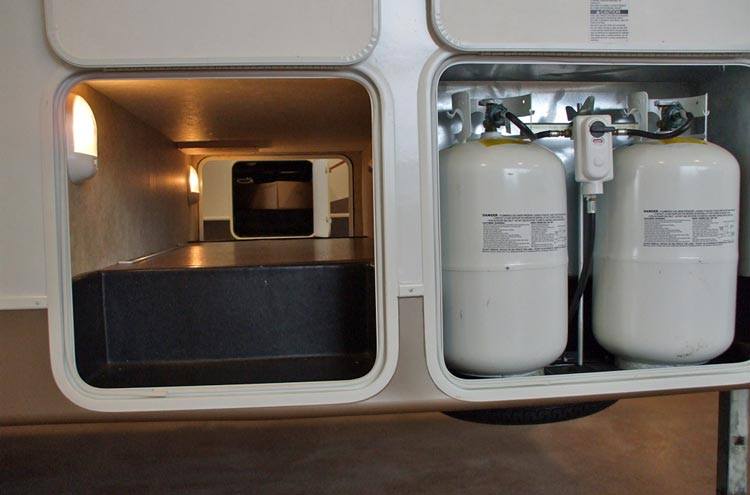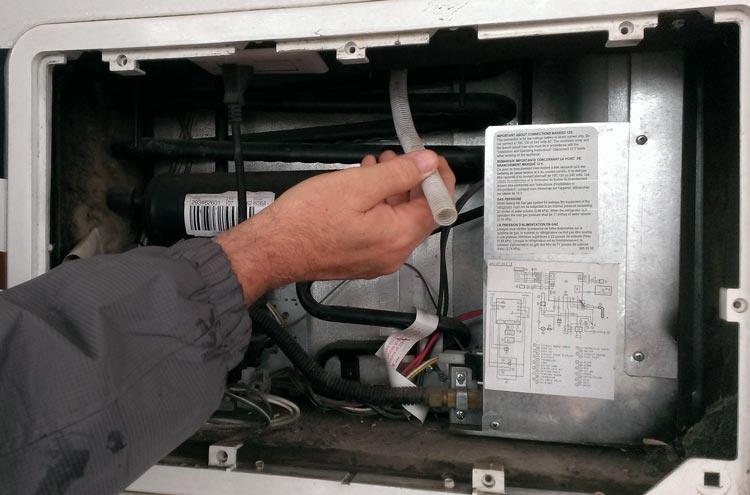
Deciding to camp out at a lake, ocean, mountains, or any other remote places requires you to always make sure that the foods you brought with you stay cold. While you can bring a cooler as it can aid in letting the foods remain chilled and cold, you may have a difficult time accessing ice, especially if the location is remote.
Buying ice every day is also costly. In that case, you should consider investing in a propane RV refrigerator. What’s good about a propane refrigerator is that you can use it anywhere. It does not rely on many things aside from the battery and propane, making it useful even if you are camping in a very remote location.
Quick NavigationHow Does a Propane RV Refrigerator Work?Actual Propane Consumption/Usage of an RV RefrigeratorCan you Lower Propane Consumption?Conclusion
How Does a Propane RV Refrigerator Work?
If you choose to add a propane refrigerator into your recreational vehicle, then note that it makes use of a sealed piping system, which contains a combination of water, hydrogen, and ammonia to work. The flame of the propane tends to heat up the boiler filled with the solution containing water and ammonia.
Once the solution is heated up, it bubbles up via a percolator pump, which then releases hot ammonia vapor and brings the water back to the boiler. The vapor rises into a condenser, which is used in transferring heat into the room air then turn it back into liquid.
The formed ammonia liquid will then be drained down into an evaporator, which contains hydrogen gas. The gas reacts with the ammonia as a means of vaporizing it again. It draws the required heat energy from the fridge’s interiors, cooling down the box and its contents.
The mixture of hydrogen and ammonia also drains down into an absorber chamber, which is where the ammonia tends to dissolve again in water. This results in the release of hydrogen gas, causing them to go back up to the evaporator.
The solution containing the water and ammonia drains down to the boiler, thereby continuing the cooling process and cycle. It should be noted that from the time propane refrigerators were introduced in the 1930s, they already gained the attention of the public, especially those who dwell in remote locations.
It is mainly because it works as a great alternative to electric power.
Actual Propane Consumption/Usage of an RV Refrigerator

As for the propane consumption of RV refrigerators, rest assured that most of those that run using propane and were built in the last thirty years are designed with low emissions and fuel economy in mind. Propane refrigerators created since the 70s tend to consume half of the propane used by models from the 60s and earlier – that’s the average usage.
The fact that the former has more efficient combustion is also an indication that it has lower emissions of dangerous combustion products. This makes it possible for you to install any current model without venting it outdoors.
Also, take note that if you have a 12 cubic feet propane fridge, then it tends to consume around 1.5-lb. propane gas daily on average. This results in an energy of around 1,400 British thermal units every hour. If you have a small fridge, around 4 cubic feet, then it will most likely consume less than 1-lb. propane daily.
Larger units, on the other hand, consume almost 2 lbs. daily. Also, take note that the actual propane consumption differs a bit based on brand.
Can you Lower Propane Consumption?
The answer is actually yes. If you want to lessen the propane consumption of your RV refrigerator even further and make efficient use of it, then take note that some tips, including the following, can help:
Commonly propane gas is used for domestic and commercial purposes. Because it is a form of natural gas that can quickly change its transition from gas to liquid in the right conditions. It is harnessed from natural gas and petroleum gas. Its production eliminates other natural gases such as butane, ethane, and propane leaving behind a high concentration of propane.
Therefore, it is fundamental since it has an increase in safety and prevents leakage of the gas. Another main reason why propane is preferred is that it has combustible properties and does not produce any harmful emissions while being used.
The reason for that is, when propane is placed in containers, little space is left at the top of the containers to help regulate the temperature. When heating goes on, some properties tend to heat faster than others creating some imbalance. This causes a change in ignition properties usually seen as the gas continues to be used.
Level the fridge and the RV
The first thing that you have to do is to ensure that your recreational vehicle is fairly level for the fridge for it to operate efficiently and properly. If you have an older model, then note that it requires a more precise modeling.
Newer models, on the other hand, also need to be almost level to deliver an optimum performance. Such helps ensure that the propane will be used efficiently. Furthermore, there is a tendency for your cooling unit to be damaged permanently if you operate it out of its level.
Put cold foods in the fridge first
Remember that the fridge’s initial cooling down process often takes around 4-6 hours. It would be best for you to turn it on one day prior to your actual departure and before putting foods inside. As for loading foods, make sure to put cold foods inside first.
Putting cold foods inside, instead of warm ones, is a major help in letting the unit work less as a means of cooling down. This can result in less consumption of propane initially. Avoid over-packing the fridge, too. Make it a point to add space in between each food to ensure that air circulates well.
Invest in battery-operated fans for RV refrigerators
The majority of RV refrigerators today do not come with fans within that are helpful in circulating cold air around the foods in your refrigerator and freezer. In that case, you should consider investing in battery-operated fans for RV refrigerators. Put these fans at the bottom part of both the fridge section and the freezer.
The good thing about these fans is that they perform well in circulating air inside the compartments. Furthermore, the fans can help improve the fridge’s efficiency by promoting proper air circulation and reducing the initial cool-down period by up to 50%.
Constantly examine the back of the fridge for obstructions
Remember that the heat produced by the process of cooling tends to be vented behind the fridge. In that case, the air enters via the outer lower fridge vent while drafting hot air out of the vent.
With that said, it is crucial for you to constantly examine the back part of the unit as well as its roof vent for obstructions, such as leaves, bird nests, and other debris. Such might prevent the escape of excess heat, causing problems in the unit’s efficiency in the long run.
Do some routine maintenance
To ensure that your propane RV refrigerator continues to operate efficiently, you have to perform some routine maintenance. Note that a properly maintained fridge is the key to ensuring that propane consumption is reasonable.
Check the fridge for soot, rust, and any other item or obstruction that might hinder its performance. Clean it regularly, too.
Lower temperature setting if it is cold
Remember that the temperature outside also has a major impact on the efficiency and performance of your RV fridge. With that said, you should consider lowering the setting of the fridge’s temperature in case it is cold outside.
However, if it is hot, you can also increase the setting. Make sure that you check whether the temperature of your fridge is already preset. It is because some units’ temperatures are already preset based on their manufacturers.
Conclusion
Before installing a propane RV refrigerator, you have to familiarize yourself with how much propane the unit actually uses. That way, you can prepare yourself for the actual propane consumption. Also, once installed, you should consider applying the tips on making efficient use of the fridge so you can have a reasonable propane usage.